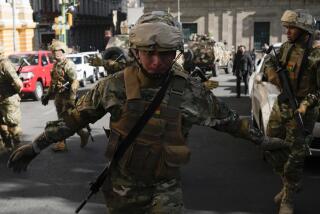Zimbabwe at critical impasse as Mugabe refuses to step aside
- Share via
Reporting from HARARE, Zimbabwe — Zimbabwe reached a critical impasse Thursday after President Robert Mugabe rebuffed military demands that he step down and a regional negotiation team left the country without an agreement.
The military took control of the country early Wednesday, sending troops to surround the president’s residence, and promised Mugabe immunity, safety for his family and a peaceful retirement.
On Thursday at the presidential office, known as State House, Mugabe met with Zimbabwean military commanders and envoys sent by South African President Jacob Zuma. Also present was a trusted Mugabe confidant, Father Fidelis Mukonori, a Catholic priest who has been acting as an intermediary.
The military has denied that its actions constitute a coup and says that Mugabe remains commander in chief, an insistence that appeared aimed at appeasing neighboring countries in a region where coups are rare.
As part of an exit deal, the military wanted Mugabe to reinstate the vice president he fired last week, Emmerson Mnangagwa, who has the support of the armed forces. That would pave the way for him to become acting president in a transitional government as the country prepared for elections.
Regional leaders do not want to appear to endorse Mugabe’s removal for fear of encouraging future coups.
But his power is essentially gone, and the regional leadership body, the Southern African Development Community, is unable to offer him meaningful support.
After the meeting, the group announced it would hold an extraordinary summit to discuss the issue.
Mugabe has long been seen as an anomaly in a region where democratic elections are the norm, clinging to power since independence in 1980 through a series of elections beset by violence or otherwise flawed.
The state-run Herald newspaper, which appears to have fallen under the influence of the military generals, published photographs of Mugabe meeting the South African envoys and senior government and military officials. In one image, Mugabe was seen shaking hands with Gen. Constantino Chiwenga, the head of the armed forces, who was smiling.
Another state-owned newspaper, the Bulawayo Chronicle, reported that lawyers said the military intervention was “legal.”
Should Mugabe refuse to quit, military leaders have limited options. They could forcibly depose him, have him declared medically unfit to govern, or orchestrate a no-confidence vote against him in parliament.
“It’s tricky because they want to be legitimate,” said political analyst Earnest Mudzengi, director of the Media Center, a space for independent journalists to work. “They want to give Mugabe a soft landing, and they still have a lot of respect for him.”
A prominent opposition figure and former finance minister in a previous government of national unity, Tendai Biti, said that the military’s power grab — which he called a coup — was illegal but that it offered the country an opportunity to move forward after years of incompetent and corrupt government.
Southern African leaders who were terrified by the military takeover, he said, but could play an important role by pushing for a new inclusive transitional government.
“Every second that turns into an hour and that turns into a day strengthens the hand of those who are in power,” Biti said. “That’s why we have to make sure we negotiate a road map back to a transitional government and democracy.”
One complicating factor is that the envoys sent by the South African president — the minister for state security and the minister of defense and military veterans — are not viewed as having the stature to help Mugabe and the military reach a compromise.
Biti said that it would require an African elder statesman with clout, such as former Nigerian President Olusegun Obasanjo, to convince Mugabe that reinstatement as president is not an option.
“Zuma has to up his game,” he said. “They have to come up with a solution that doesn’t encourage other coups in future and ensure that there’s a sustainable road map in Zimbabwe.”
“The Robert Mugabe I know will not resign,” Biti said. “Mugabe is going to dig in.”
At the center of the dramatic impasse is Mugabe’s luxury mansion in the lush suburbs of Harare, built by the Chinese government and popularly known as the “Blue House” because of its deeply hued roof of blue Chinese tiles.
Mugabe, his wife, Grace, and a small contingent of his presidential guard have been staying there. He traveled to the official presidential office for Thursday’s meeting, then returned to the mansion.
Several key Mugabe loyalists, accused by the military of being “criminals,” were reportedly being held in cells at the military headquarters.
They included police commissioner Augustine Chihuri, deputy head of the Central Intelligence Organization Albert Ngulube, Finance Minister Ignatius Chombo, Higher Education Minister Jonathan Moyo, political commissar Saviour Kasukuwere and head of the ruling party youth league Kudzanai Chipanga.
In a apology to the military that was televised Wednesday, Chipanga begged Chiwenga and other generals to forgive him for an earlier statement attacking them.
On Thursday, opposition leader Morgan Tsvangirai called on Mugabe to resign immediately and for the establishment of a transitional government that include members of the opposition.
His statement notably avoided criticizing the military seizure of power and instead expressed gratitude to commanders for “the commitment to peace and the sanctity of human life by the Zimbabwe Defense Forces, including respect for citizens’ fundamental rights.”
UPDATES:
3:05 p.m.: This article has been updated throughout with staff reporting on political developments and analysis.
This article was originally published at 7:05 a.m.
More to Read
Sign up for Essential California
The most important California stories and recommendations in your inbox every morning.
You may occasionally receive promotional content from the Los Angeles Times.













